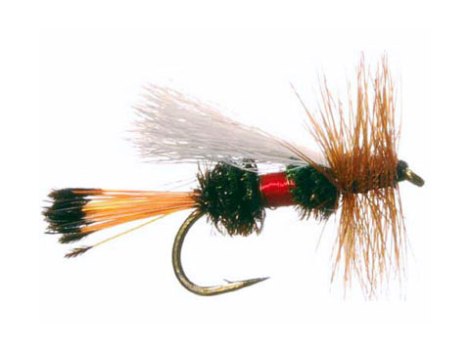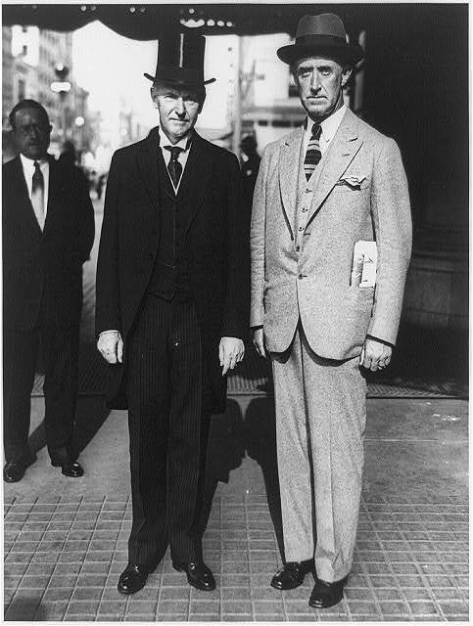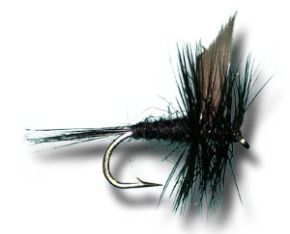It was “Colonel” Starling, the head of the President’s Secret Service Detail, who encouraged Coolidge’s fascination with fishing. He had certainly fished before, growing up in Plymouth, but it was due to the Kentuckian’s influence that he became an avid fisherman, including practice in the art of fly fishing. It was during Coolidge’s famous summer of 1927 in South Dakota that Starling recounted the President’s experience with the Royal Coachman and the Black Gnat,
“One of the first things he did was to admit to the newspapermen that he used worms to catch trout. This precipitated a hullabaloo, with all the fly fishermen in the region shouting that to use worms was unsportsmanlike. The controversy was silly–any fisherman will use worms rather than go home with an empty creel. But I planned to convert the President to flies if I could.
“A few days later he was fishing the same stream with a guide. I was behind about a quarter of a mile, trying my luck with a Royal Coachman. He went for me. ‘There’s an ol’ fish here that won’t bite,’ he said. ‘He keeps taking my bait.’
‘What are you using?’ I asked.
“He showed me his hook. On it he had a salmon egg and a grasshopper.
‘No wonder he won’t bite,’ I said. ‘The bait is too big for him to swallow. There isn’t a fish in the stream who could get all that in his mouth.’
“He ignored my criticism. ‘Suppose you try your dry fly,’ he said.
“I made a few casts with my Royal Coachman. The fish played with it but wouldn’t bite. Then I changed to an old, dilapidated Black Gnat. I put it on the grassy bank then pulled it back into the stream. Immediately it was sucked into the current, and the trout, with a mighty lunge, took it as if he had been waiting for it all his life.
“The little fellow [as Starling called the President] got so excited that he tangled his own line up in his rubber boots. He called to me, ‘Don’t lose him! Don’t lose him!’ He told me how to play him. Finally, unable to stand the excitement any longer, he grabbed the landing net and waded into the water above his boot tops. With a quick thrust he got the trout, then carried it ashore, where the guide removed the hook from its mouth. Without a word he carried the fish to the automobile, and that was the last I saw of it. But my purpose was accomplished. Thereafter he fished with flies” (“Starling of the White House” pp. 250-1).
As he prepared to leave the White House, Mr. Coolidge began planning to go on a cross-country fishing trip with Starling, once they both retired, spanning from the Brule River trout enjoyed the next summer to the salmon of Washington state and Oregon. Though, for various reasons, it never happened, the President wrote this, perhaps with his friend in mind, “At heart we are all fishermen. Some of us never had a chance to practice the art. Some have known it only through the use of expensive rods and fancy tackle, on elaborate artificial preserves. But the real fishermen associate the sport with a barefooted boyhood, where pole, bait, stream and the alder branch on which the fish were strung were all the product of nature…The open country, the unhurried silence, the refreshing leisure are a stimulation to the body and a benediction to the soul. Even the imagination expands and the credulity is disciplined in telling and listening to adventures with rod and reel. There is something natural, homely, wholesome and unspoiled about fishermen which we shall all do well to cultivate” (April 6, 1931).

The Royal Coachman

President Coolidge with his friend, Colonel Starling

The Black Gnat
What became of Starlings’ “papers”?
In his preface Thomas Sugrue describes “two large packing cases” of Starling’s papers from the administrations he served. Diaries, too! What became of them? Last seen in Florida . . .
Sugrue’s next writing partner was Edgar Cayce. Maybe he could tell us?
Reblogged this on The Importance of the Obvious and commented:
Before Throwback Thursday, sharing a little story for Trout Tuesday…perfect for a summer like this one when Colonel Starling helped win President Coolidge to the joy of fishing. Happy Fishing, everyone!